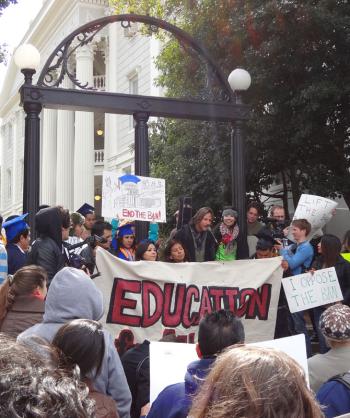Let Undocumented Students Attend College
Comment
In April 1963, the Rev. Dr. Martin Luther King Jr. wrote his now-famous “Letter from a Birmingham Jail.” The letter, addressed to eight white religious leaders, expressed King’s disappointment in white churches’ silence and complicity with the systemic and structural sin of segregation. King argued that segregation was killing the soul of America because “injustice anywhere is a threat to justice everywhere.”
So often churches sit on the sidelines in silent witness to injustice. We pray that all people shall be treated equally as God’s children. But from our places of comfort and privilege, it is easy to stay focused on our own lives.
We, the adult Sunday school class at Oconee Street United Methodist Church, studied King’s letter for several weeks. We felt called to make our own statement about a new instantiation of the injustice King decried. This injustice is the segregation of Georgia’s public colleges and universities, where currently undocumented students are barred from admission at the five most selective institutions and charged prohibitive out-of-state rates at others.
We do not speak for our denomination, nor even for our whole congregation, but as individual citizens, voters, taxpayers and committed persons of faith. We, like King, fear “we will have to repent in this generation not merely for the hateful words and actions of the bad people but for the appalling silence of the good people.”
In that spirit, we can be silent no longer. We have to respond, to take a written stand against undocumented youths being kept from the learning and life opportunities of Georgia’s outstanding universities. As King wrote, “Anyone who lives inside the United States can never be considered an outsider anywhere within its bounds.”
Legal segregation is an historical embarrassment for the South. We view the current ban on undocumented students as an iteration of that same injustice, this time targeted at people of Latino descent.
King argued that because of the failure to pass laws guaranteeing racial equality, “We realized that we were the victims of a broken promise.” Undocumented college-seeking students in Georgia also experience the devastating consequences of a broken promise.
As Georgians, Americans and Christians, we call on the Board of Regents to allow students from Georgia to attend the state’s 35 public universities for in-state tuition rates regardless of documentation status.
Broken Promises
Immigrant students are integral members of our communities, students who have attended public schools for many years, some for their whole lives. Educators and society have told them—promised them—that if they do well in school, they will be able to go to college. Those students who have the required grades and test scores have earned the right to attend Georgia institutions of higher education.
One indication of this is the Deferred Action for Childhood Arrivals (DACA) federal policy. According to the United States Citizenship and Immigration Services, “an individual who has received deferred action is authorized by the Dept. of Homeland Security to be present in the United States, and is therefore considered by DHS to be ‘lawfully present’ during the period deferred action is in effect.”
This should satisfy the conditions of the Board of Regents, at least for DACA students and all undocumented students who meet the criteria.
The cost of oppression cannot be ignored. The quality of our workforce is harmed when meritorious selection is based on residency, not scholastic aptitude. Our contributions to the state and global economy benefit from policies of inclusion, rather than exclusion.
Georgia benefits from a highly educated population in myriad ways, as emphasized in the Complete College Georgia initiative. As stated in that document, “Georgia’s level of higher education attainment is not expected to increase without significant intervention.” Complete College Georgia goals include a 60 percent community college and university completion rate, up from the current rate of 42 percent.
Undocumented students are denied opportunities to increase their intellect and positively contribute to our state and nation. This is their home. Many of them have no memories of any country but America.
Although they may not yet be American citizens, they are just as American as documented citizens. They have worked for 13 years of school towards this American Dream that is supposed to be open to everyone, but when they try to further educate themselves, they are faced with obstacle after obstacle that would weaken the spirit of anyone.
Don't Discriminate
With the benefit of hindsight, we can agree that Georgia’s history of racial discrimination makes it imperative that we do not perpetuate unjust policies. Education policies tilted to “legitimate” Georgia residency tread dangerously close to the sins of our past by linking ethnicity, even when linked only implicitly, to resource allocation.
Advocating a policy position that ignores a student’s aptitude in favor of arbitrary residency determinations is not the way to promote knowledge capital in Georgia, global-minded citizenry or the love for our neighbor as ourselves that Jesus taught and a principle that is central to most religions.
The Bible, an ancient text about living in community, repeatedly advises us to take care of the “alien.” Exodus 22:21 says, “You shall not wrong or oppress a resident alien, for you were aliens in the land of Egypt.” And indeed, many of us only have to look back to our parents, grandparents or great-grandparents for our own immigrant stories.
In the Gospels, as Jesus instructs us over and over to take care of each other, he repeatedly demonstrates that taking care of “your neighbor” means taking care of all people. In Matthew 25:35, Jesus taught that the way to live a moral life was to treat all people as if they were Jesus: “For I was a stranger and you welcomed me.”
Let us take care of our undocumented youths as neighbors, as youths who have been embraced and raised in our public education system, as youths for whom Georgia is home.
If Georgia’s educational system does not make good on the promise of education for all residents, it will neglect its mission, forfeit the respect of our young people, and be dismissed as an unjust system. Young people’s disillusionment with the inequities of higher education has made many, citizen and non-citizen alike, distrustful of the system.
Many of us are educators, and all of us are affected by the quality of higher education as parents, employers and citizens. We look forward to dialogue and to the lifting of the dark cloud of segregation that once again hovers over our state.
Signed: JoBeth Allen, Lew Allen, Enrique Alpaugh, Jenny Alpaugh, Julie Alpaugh, Rebecca Alpaugh, Albert Askew, Sally Curtis Askew, Robert Ayers, Lisa Caine, Jamie Calkin, Katie Calkin, Chad Clark, Hope Cook, Chase Cook, Joseph Dennis, Carla Dennis, Valerie Duncan, Maxine Easom, Gail Hanula, Tom Himelick, Wilma Hutcheson, Joe Long, Clint Richard Martin, Sharon Nester, Sharon Pendley, Amanda Scott, Joel Siebentritt, Leland Spencer, Hal Turner, Carter Vest, Steve Williams
Comment is an occasional opinion column highlighting local issues. Send Comment ideas to [email protected].











comments